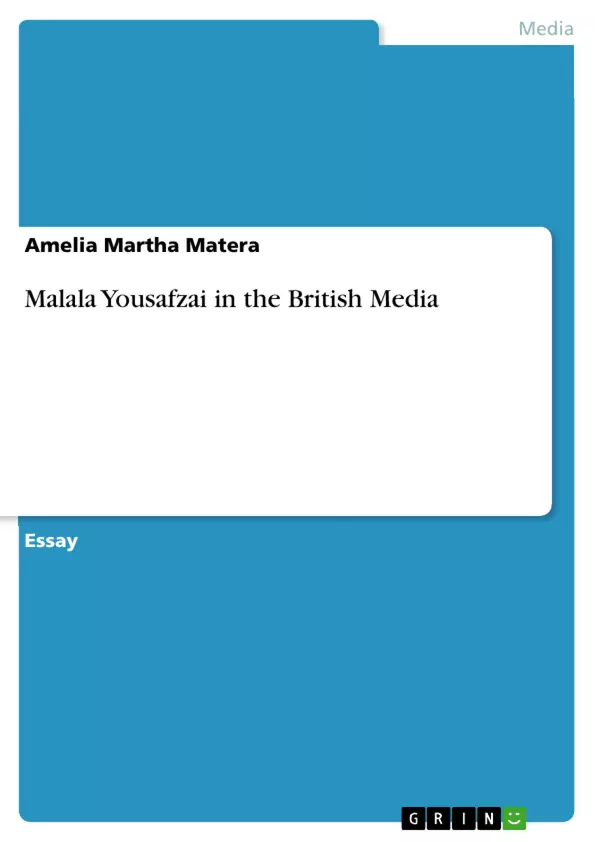This paper is an analyse of the research conducted by Rosie Walters, PhD in Politics at the School of Sociology, Politics and International Studies of Bristol.
Walters wants to understand how the case of the Pakistani journalist Malala Yousafzai has been presented in the UK newspapers. By using a discursive analysis, Walter finds out an emancipatory discourse about the young activist. Walters` aim is here to understand if this occidental view can tell us something about the West itself. Outcome of this research is an unequal relationship between the United Kingdom and Pakistan, it is a gendered and orientalistic discourse which shows interesting
(expected or not) “prejudice” of the British media discourse.
Aim of this paper is to analyse the methodologies and theories Walters uses and how these help the author to explain the outcome of the research.
Table of Contents
- Introduction
- Overview on Article
- Theory
- Methodology
- Analysis
- Critics
- Conclusion
- References
Objectives and Key Themes
This research paper examines how the British media presented the story of Pakistani journalist Malala Yousafzai, analyzing the discourse surrounding her activism and the portrayal of her in UK newspapers. The study uses a discursive analysis to understand if the dominant narrative reflects an emancipatory discourse about the young activist and if this occidental view reveals insights into the West itself.
- Discursive analysis of Malala Yousafzai in British media
- The role of gender and orientalism in the discourse
- The relationship between the West and the East
- Poststructuralist, feminist, and postcolonial perspectives
- The construction of masculinity in the media
Chapter Summaries
- Introduction: This section introduces the research conducted by Rosie Walters on the media portrayal of Malala Yousafzai in the UK. The paper aims to analyze the methodologies and theories Walters employs to explain her research findings.
- Overview on Article: The protagonist of Walters' research is Malala Yousafzai, a young Pakistani feminist activist fighting for girls' education. This section provides background information on Malala, her activism, and the events that led to her becoming a global figure. It also highlights the focus of Walters' research on how the British media depicted Malala and whether there is a predominant occidental view and prejudice against the orient.
- Theory: Walters analyzes the topic from a poststructuralist, feminist, and postcolonial approach, aiming to understand the portrayal of the East and its implications for the West. This section discusses these approaches, including discourse analysis and the works of Foucault, highlighting the intersection of gender, power, and representation in international politics.
- Methodology: This section outlines the methodology used by Walters, including her use of Roxanne Doty's concepts of predication, presupposition, and subject positioning. It also emphasizes the use of intertextuality as a key approach to understand the logic of the text. Walters clearly defines the time frame and spatial frame of the study, analyzing national newspapers published between 9th October 2012 and 21st July 2013. She identifies the newspapers analyzed: the Daily Mail, The Guardian, The Independent, The Sun, and The Telegraph, and highlights the importance of considering the biography and personal details of the article authors.
- Analysis: This section delves into Walters' analysis using Doty's approach, focusing on the concepts of predication, presupposition, and subject positioning. It examines how the British media constructed representations of Malala as a "little girl," the Taliban as "extremely Muslim," and the superiority of British medical treatment compared to Pakistan.
Keywords
The key concepts explored in this research include: Malala Yousafzai, discursive analysis, feminist theory, postcolonial theory, orientalism, media representation, gender, power, and British media discourse.
Frequently Asked Questions
How did British media portray Malala Yousafzai?
Research suggests the media used an emancipatory but also gendered and orientalistic discourse, often reflecting Western prejudices about the East.
What is the "orientalistic discourse" mentioned in the study?
It refers to a perspective that constructs an unequal relationship between the UK and Pakistan, often portraying the West as superior in medical or moral terms.
Which theoretical approaches are used to analyze Malala's case?
The study employs poststructuralist, feminist, and postcolonial theories, including Foucault's ideas on discourse and power.
What methodology was used for the media analysis?
The author used Roxanne Doty’s concepts of predication, presupposition, and subject positioning to examine national UK newspapers.
Which newspapers were included in the research?
The analysis covered articles from the Daily Mail, The Guardian, The Independent, The Sun, and The Telegraph published between 2012 and 2013.
- Quote paper
- B.A. Integrated European Studies Amelia Martha Matera (Author), 2018, Malala Yousafzai in the British Media, Munich, GRIN Verlag, https://www.grin.com/document/425360



